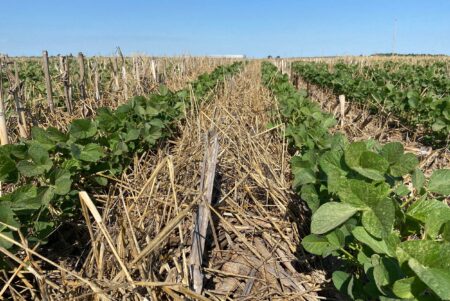Braswell Family Farms, a founding member of Eggland’s Best, got its start more than 80 years ago when two brothers bought a grist mill in Nashville, NC. Today, the company is one of the largest specialty egg producers and organic feed mills on the East Coast and has under the leadership of fourth-generation producer Trey Braswell.
Listen to the Podcast
Subscribe to 15 Minutes With a Farmer on Apple Podcasts, Spotify, or wherever you listen to podcasts. Please rate and review us!
Meet Trey Braswell
For nearly 150 years, children have been rolling eggs down the hill on the South Lawn of the White House on Easter Monday. For the past three years, Braswell Family Farms in Nashville, North Carolina, has provided 112,000 eggs for the event.
The White House Easter Egg Roll began with a spontaneous gathering of families on the South Lawn in the 1800s. Because of the toll on the Capitol grass, according to the National Park Service, Congress had passed a law forbidding such shenanigans on that building’s grounds in 1876. Two years later, President Rutherford B. Hayes invited children to roll their Easter eggs on the White House lawn, and they’ve been doing it ever since.
In recent years, guests must enter an online lottery for a chance to win tickets to the event, which has included storytime, games, and live entertainment.
Humble Beginnings
Braswell Family Farms, which began in 1943, is led by President Trey Braswell. The company got its start when Braswell’s great-grandfather and great-great-uncle bought an old gristmill, grinding corn into cornmeal for extra income.
“They were part of a generation with a multitude of kids, and the family was farming just a little tiny bit of land at that point, so it couldn’t support all those kids and their families,” Braswell said. The two brothers went to work for the owner of a nearby water-powered gristmill; he worked with them to finance the mill a year later, when he was ready to retire.
“Then, my great-uncle and my granddad joined the business, and it was clear that they were going to have to expand,” Braswell said. “And that’s kind of where they started into feed and animal production. They started raising baby chicks, the pullets, which are the immature laying hens.”
The Braswells also began selling eggs.
The family bought a second old mill in town to produce custom-bagged feed, Braswell said, which was well received, since most farmers had a variety of animals, including mules, cattle, and chickens.
Times were tough for that generation, but they persevered. “There were so many days of waking up not knowing if they could make payroll,” Braswell said. “It was such a volatile commodity business. The men that were in this business and the families that were supporting them really sacrificed so much, and I am so forever grateful for that.”
Updates were made, and today, the farm and mills have state-of-the-art facilities. “The family who came before me took a lot of risk to be able to grow and provide jobs for people here in Nashville and Nash County and North Carolina,” Braswell said. “It really is humbling to me, and it keeps me humble and grateful for what we have today, and to be mindful of the employees and the family, for what they did to get us here.”
Braswell Family Farms became a founding member of Eggland’s Best in 1989. The company’s franchisees’ chickens consume a patented feed that helps produce eggs with more vitamin E, omega-3 fatty acids, and iodine, and less saturated fat than regular eggs, according to nutritional information on the company’s website.
“The egg business was very hard,” Braswell said. “You might have a good year, then lose it all the next year. Praise God that my granddad and great-uncle took a chance on it. They bought the [Eggland’s Best] franchise for most of North Carolina. My granddad died and never got to see it actually be successful, but I don’t know if we’d have survived without it. And my dad, who we lost last year, stuck with it too.”
In addition to producing their own eggs, the company obtains eggs from small family farms in North Carolina and Virginia. Today, Braswell Family Farms is the second-largest Eggland’s Best franchise in the U.S. and one of the largest organic feed mills on the East Coast.
Braswell grew up working all kinds of jobs on the farm. “I cleaned the mill floors and unloaded railcars, and when we started building our plant in 1999, I was the gopher for the maintenance manager,” he said. “It was neat, just getting to be a part of it all alongside folks I had a lot of respect for and that I knew worked hard.”
Trey Braswell
We just want to honor the Lord [for] what He’s given us. We feel like we’re just here to be good stewards of His resources and our mission is to feed the body and the soul.
— Trey Braswell
Courtesy of Braswell Family Farms
Delivering Easter Cheer
Braswell first supplied eggs to the White House in 2022, with a delivery of 18,000. That number rose to 30,000 in 2023, and more than 64,000 in 2024. But it’s not just a matter of collecting and delivering the eggs.
In late March, eggs were transported daily from the farm to The Stocked Pot, a caterer in Winston-Salem, North Carolina, where they were hard-boiled, dyed, and packaged. Then, they were driven to a Braswell warehouse in Virginia until being brought to Washington a few days before the event.
Last year, the Braswell and Stocked Pot team boiled and dyed more than 6,000 eggs per day for eight days, working with White House staff to create signature colors. Because not all eggs take color the same, some had to be dyed multiple times to attain the perfect shades.
“I went to the White House Easter Egg Roll once when I was a kid and I can barely recall it,” Braswell said. “But I do remember just how kind of surreal it felt to be on the White House lawn. I wanted my kids to experience that. Last year, I took my family up there, and it was just incredible. Regardless of who the president is, we know that we’re producing these eggs for American children to be able to have fun at the White House, which is what they should be able to do. So it’s just been an amazing experience. It’s an honor.”
Links and Resources
Browse these resources from our website:
Transcript
Please note: This transcript has not been edited.
Lisa Foust Prater: Welcome to the 15 Minutes With a Farmer podcast from Successful Farming. Today my guest is Trey Braswell, a fourth-generation feed and egg producer from Nashville, North Carolina. His family was a founding member of Eggland’s Best, and they have been honored to supply eggs for the White House Easter Egg Roll multiple times.
In each episode, I have a quick 15-minute conversation with a farmer to hear their story and share their experience, expertise, and life lessons.
I’ve been looking through your website and it’s great to look back at all the history that you have shared about your family and the business. it’s always so interesting to me to see how farmers in the past and today have found ways to be industrious and create businesses where there’s a need and just fill that gap. so tell us about your grandfather and his brother and their milling endeavor.
Trey Braswell: I agree, farmers always figure out how to meet the need, regardless. So we face that every day as egg farmers. And we always figure it out, whatever’s put before us. So I’m the fourth generation leader at Braswell Family Farms. And so the first generation was my great granddad and my great-great uncle and they were a part of a generation of a multitude of kids. I think it was eight or nine and so it was kind of the typical American story. The family was farming just a little tiny bit of land and at that point, nine families could not live off a very small farm. So these two went down, they walked down the road about a mile to a gentleman.
Mr. Strickland owned Boddie Milling Company, Boddie’s Mill, which was a grist mill, a water-powered grist mill, and they were making cornmeal. So they went to work for him for a year or so, and then I think he was ready to get out, retire, and so he financed it, and they started to buy it from him. And that was where we say that our endeavors in the milling and grain and feed began.
They impacted a lot of families and we’re thankful for the hard work and the sacrifices that they made.
Lisa Foust Prater: So then when their sons joined the business, they started selling pullets to the egg producers, keeping hens, selling eggs. And so was that the beginning of the egg enterprise for the Braswells?
Trey Braswell: Yeah, it was kind of a similar story. There weren’t nine children, but this little gristmill, was, they would buy corn and sell cornmeal on a local route, or people would come and ask them to mill their own corn and give them cornmeal back. But that was just a small enterprise. I think it supported two families.
Then my great uncle and my granddad came back and we’re working with them and it was clear that they were going to have to do something in addition, that they were going to have to figure out what the next iteration was. And that’s kind of where we started into feed and into the animal production. They started raising baby chicks, the pullets, which are the immature laying hens.
And then we bought an old mill in town. And then they started to turn that into a custom feed mill and made a lot of bagged feed because everyone at that point still had working animals at home: mules, they all had a hog and a cow and chickens. And so our growth really came into, we were known for high quality started laying hens, the pullets, and we sold those up and down the East Coast and we sold feed in a little bit closer area because feed just, economics don’t work to go quite as far with it, but we sold feed and pullets to the great egg customers that were producing eggs. So that was kind of our next generation and again, there were so much, I mean we have issues today, but there were so many days of waking up not knowing if they could make payroll. It was such a volatile commodity business. They couldn’t afford to buy new trucks and they really sacrificed so much. The men that were in the business and the families that were supporting them, they did a lot and I am so forever grateful for that.
Then over time as we were doing a lot of bag feed, but then as more kind of commercial intensive livestock farming came about, we started making bulk feed for chickens and hogs. And so then they just kind of added on piece by piece as they could. And it was always a stretch. It was a stretch to add on a corn bin or a stretch to add on a load out bin. I mean, I just heard a lot of stories from my great uncle before he passed, because my granddad died when I was six. But he would tell me lot of stories about him and my granddad kind of fighting it out, stressing over a decision. And they would fight it out. They’d debate it, sometimes physically. But then they were done. They made a decision. They walked out united. And they took a lot of risk to be able to support the community and provide jobs for people here in Nashville and Nash County and North Carolina. It really is humbling to me and it keeps me humble and grateful for what we have today and to be mindful of everybody that came before me, the employees and the family, for what they did to get us here.
Lisa Foust Prater: So when you were growing up in the family business, what kind of things were you doing on the farm?
Trey Braswell: Yeah, I mean I can remember as a kid just going with dad to the pullet houses, seeing the baby chick. That’s what’s so great about a family business and we work hard to try to keep that now is that like we were so close with all the people and it gets harder as you get larger and have multiple locations but now we were so close to everybody like there were people we called aunt and uncle and as a kid I probably seriously thought they were aunt and uncle. Like we had you know wives of farm managers that we would go stay with and they babysat us. It was just wonderful. We’d go out to the egg farm and I remember just going in the cooler and being little and just seeing all the eggs and it was just, it was such a smaller scale but it was just like wow this is amazing seeing the chickens.
Just young, I’d go with dad and visit. And then as I got into high school, I would work in the mill, sweep the floors, because that was something that my dad and my great uncle instilled is that we keep a clean feed mill. Well, a clean operation, but the feed mill was kind of the heart of it back then. And I’d unload rail cars. I’d keep the micro-bins full.
And then when we started building our plant in 1999, I went out there with the maintenance manager and just kind alongside of them, kind of being the gopher and helping them build it, help it as we started it up, just learning and doing maintenance. So it was neat, just getting to be a part of all of it, you know, getting to be alongside folks that I had a lot of respect for and that I knew worked hard.
Lisa Foust Prater: Well, and having them see you work hard and, you know, not be afraid to be the one who’s sweeping the floor and unloading the rail car. You know, I’m sure they respected that about you and that you’re not just the son who’s coming in to take over, that you really worked hard and worked your way up and understand the work. And I mean, that says a lot about you too, and your family, that you’re you’re doing the work. You know, that’s a good thing.
Trey Braswell: Yeah, I certainly wasn’t perfect, but I knew that I was going to have to earn people’s respect. I certainly didn’t expect it. And it took a while. And I knew that would be the case. We’ve got a lot of great employees. A lot of them have been here for a long time. Only by God’s grace, He kept me humble and with the attitude of knowing that I’ve got to build trust, earn their respect. And it’s been a long journey. It’s been a good journey that I’m thankful for.
Lisa Foust Prater: Your family’s business became a founding member of Eggland’s Best. tell me about that, what that means, what that meant for you guys and just how that whole process works.
Trey Braswell: Two gentlemen from Japan had come up with a patented feed that improved the nutritional content in the egg. And they, you know, they patented that and then they came to America and said, you know, we think this is an idea that would work. And so at the poultry expo in Atlanta, which we have every year and it was in the early or late 80s, I don’t know exactly how, but somehow they had contacted a larger group of farmers and said they were selling franchises by metropolitan markets.
Praise God that my granddad and great uncle, before my granddad died, said, “We need to take a chance on it. There’s got to be a better way than we’re doing it right now. I don’t know if we’ll survive without it.” And so they bought the franchise for most of North Carolina. And today, it’s still the only nutritionally enhanced egg and it has distribution.
I think 97-98 % distribution meaning it’s in 98 % of all outlets where eggs are sold now. And so we’re one of the franchisees and again, it’s been a real key to our success.
Lisa Foust Prater: So with Easter around the corner, I’d like you to tell us about your experience with, this is so amazing, the White House Easter egg roll.
Trey Braswell: Well, we are honored that we’ve had the opportunity to supply the eggs for the White House Easter Egg Roll in the past. We’ve done it for a number of years. And just for the past few years, we’ve actually produced the eggs and gone through the process to hard cook them, dye them, and deliver them to the White House. And that has really been surreal. Regardless of who the president is, we know that we’re producing these eggs for American children to be able to have fun there at White House, which is what they should be able to do. So it’s just been an amazing experience. To be able to do that, it’s an honor. Last year I took my family up there and it was just incredible.
I went once when I was a kid and I can barely remember it, but I do remember just how kind of surreal it felt to be on the White House lawn. So I wanted my kids to experience that and it was so neat. I’m really thankful and I hope we’ll get a chance to do that again in the future.
Lisa Foust Prater: Yeah, what a full circle moment to have been there as a child and then go back and be the one supplying the eggs and to have hard cooked them and dyed them and what a massive undertaking.
Trey Braswell: It is. It’s a great partner. I tell folks that when we got the opportunity, American Egg Board had talked to my sales leader, John Watson. And he quickly told him yes without asking me. But he knew what I would say. And so I told him, “That’s great. Now you find somebody who can handle hard cooking and dying them.” And he was able to find a great partner that helped us with that and has kind of got the process dialed in. You know, we’re really excited about that, but we couldn’t do that on our own. Like, we just have, you know, we’re full-time producing these eggs. So it takes kind of an army and a village to get the rest of the process done.
Lisa Foust Prater: That is so fun. What a cool thing to be able to do and just a neat thing to share with your kids and the American kids who are there that day and celebrating Easter and getting to do something really unique and fun and something they’ll always remember. And you were a part of that. That’s so neat. So, okay, so one last thing or a couple of last things I have to ask. What is your favorite way to eat eggs?
Trey Braswell: My favorite way to eat eggs would probably be in like a, we call it like Christmas morning casserole. It’s eggs, bread, cheese, sausage, milk. I love that. And obviously I just have an emotional tie to it. Because growing up, we always had it on Christmas morning. Probably my favorite way. And then omelets. Like I love omelets and just the more meat and vegetables, the better. So those are my favorite ways, but like, the way most often is scrambled because it’s in the morning. Scramble some eggs. It’s so easy. My kids love it. Sometimes they don’t want it in the morning, but they’ll want it in the afternoon. So scrambled or either scrambled this morning, had scrambled with spinach and peppers and onions in it.
Lisa Foust Prater: Very good. Well, I’m an over medium gal myself, but that’s a tricky one. So, you know, you can’t always order that in a restaurant because it’s tough to get exactly right.
So what’s next for you and the farm?
Trey Braswell: We’re investing in pasture raised organic eggs and free range eggs and organic. We feel like we do a good job. It takes extra care. It’s more expensive to do. But that’s where we focus. We want to continue to be and grow to be a leading provider of premium and specialty eggs on the East Coast and here in the Mid-Atlantic. We just want to honor the Lord with with what he’s given us. We feel like we’re just here to be good stewards of his resources and our mission is to feed the body and the soul.
Lisa Foust Prater: That’s so beautiful. And you know, it sounds like that’s been sort of the attitude of your family for four generations.
Trey Braswell: It has. Even if it wasn’t written on the wall, that has just been the foundation of our company for the generations.
Lisa Foust Prater: That’s wonderful. Well, congratulations on all your success and wishing you and your family just the happiest Easter and, you know, much success.
Trey Braswell: Thank you, happy Easter.
Lisa Foust Prater: Thank you for listening. Open the April issue of Successful Farming to read more about Trey and Braswell Family Farms, and visit us online at agriculture.com for more interesting features and news for your farm. Join me next week for another episode of 15 Minutes With a Farmer.
Note: As of press time, there was no word on who would be supplying eggs for the 2025 Egg Roll, but Braswell said he was ready to participate.



:max_bytes(150000):strip_icc()/Early-season-corn-wheat-storm-light-blue-f7c0b728c6634de0842577de63604ddd.png)



:max_bytes(150000):strip_icc()/TreyBraswell-horiz-e556cb1c2a2242f4897b61ef2ad9b9e6.jpg)


:max_bytes(150000):strip_icc()/7087367933_fe71c3c785_o-2-2000-1b6d1666ec374f7f927ab5b31a9c077b.jpg)

:max_bytes(150000):strip_icc()/ChipSomodevillaStaff-2208185163-b8d97bb476e5479499703f4034a0b9e5.jpg)